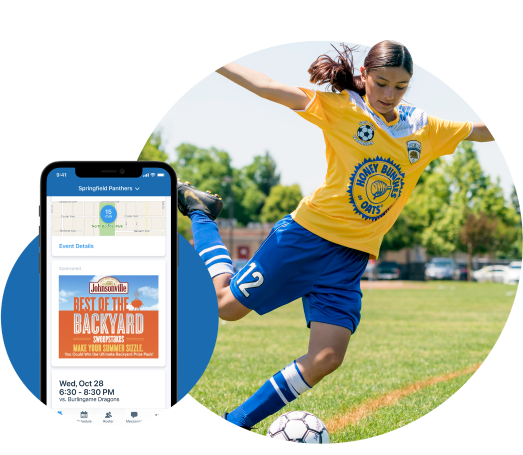How to Build a Restaurant's Marketing Plan
Learn how to build brand awareness and measure your restaurant’s community marketing initiatives.
Download the restaurant marketer’s guide to community marketing.
Download the Guide Now

Promote your restaurant to families with TeamSnap
TeamSnap empowers restaurants to create authentic relationships with families through youth sports sponsorships and digital media targeting families in the #1 youth sports coordination app. Unlike other marketing channels, we engage families when and where it matters most - at the field, at home, and on the go.
Learn how our partners including Jersey Mikes, Taco Bell, and Black Bear Diner use TeamSnap to reach the Chief Household Officer.
Learn MoreWhat is a Restaurant Marketing Plan?
In the ever-evolving landscape of the restaurant industry, establishing a comprehensive restaurant marketing plan is paramount for sustained success and growing appetites. A strategic approach ensures that your brand not only reaches its target audience, but also leaves a lasting impression.
A marketing plan for a restaurant serves as a blueprint for promoting your establishment, guiding your promotional efforts to align with business objectives. It is an essential tool that integrates various elements, from understanding your target market to implementing effective strategies.There are many elements that go into a marketing plan for a restaurant like first identifying and understanding who your ideal customer is, or doing a market analysis. It’s also important to do a competitive analysis to see what other restaurants are doing, their strengths, weaknesses, potential, etc.
Examples of Restaurant Marketing Plans
To illustrate the importance of a well-crafted marketing plan, let's dive into three restaurant marketing plan examples. These examples highlight the essential steps and key elements required to formulate a plan that resonates with your audience.
Example #1: Seasonal Promotions and Collaborations
If your goal is to boost restaurant traffic during slow seasons…Here’s where a marketing plan would come into play:
- Identify slow seasons through historical sales data.
- Collaborate with local businesses for cross-promotions.
- Launch seasonal menus or special promotions.
Result: Increased foot traffic and revenue during traditionally slower periods.
Example #2: Digital Dominance through Social Media
If your goal is to enhance brand visibility and overall engagement, here’s how a marketing plan could help:
- Identify key social media platforms for your target audience.
- Develop engaging content, including visually appealing images and videos.
- Utilize targeted ads to reach a broader local audience.
Result: Increased online presence, customer engagement, and loyalty.
Example #3: Loyalty Programs and Customer Retention
If your restaurant’s goal is to foster customer loyalty and get returning customers and business, here’s the plan:
- Implement a customer loyalty program with rewards.
- Collect customer feedback to refine services.
- Offer exclusive promotions to loyal customers.
Result: Increased customer retention and positive word-of-mouth.
Example #4: Driving Brand Affinity Through Community Marketing
If your restaurant is looking to get involved in the community, boost awareness and brand recognition, community marketing is the way to go.
- Identify the communities that align with your brand and target audience.
- Once you’ve identified the community, get involved in the discussion and share insights.
- Prioritize educational content that provides value to the community and consider offering exclusives and promotions for the community members.
- Launch campaigns that encourage members of the community to participate and share content relevant to your restaurant.
Easy Steps to Get Started with Your Restaurant Marketing Plan
Embarking on the journey of creating a robust marketing plan for your restaurant doesn't have to be daunting. Here are some straightforward steps to guide you through the process. In this section we will dive into some of the metrics and elements that make up an overall restaurant marketing plan.
Conduct Comprehensive Audience Research
Chipotle's success can be attributed to its ability to connect with its audience through a combination of authenticity, digital innovation, community engagement, and adaptability to market trends. The restaurant's marketing plan reflects a deep understanding of its target demographic and a commitment to providing a unique and memorable dining experience.
One example is how Chipotle has adapted to the growing demand for healthier dining options by offering customizable and fresh ingredients, catering to health-conscious consumers. By successfully conducting comprehensive audience research, Chipotle has tailored its menu and overall marketing strategy to resonate with its audience.
Another key elements to crafting a successful restaurant marketing plan is:
Develop Your Restaurant’s Brand
Clearly define your restaurant's unique selling proposition (USP). Craft a compelling brand story that resonates with your audience. Consistently apply your brand across all marketing channels.
Unique Ideas for Marketing Your Restaurant
In addition to the fundamental steps, start to incorporate some unique and innovative ideas into your restaurant marketing plan to stand out from the crowd.
- Engage with local events, festivals, and community gatherings.
- Consider sponsoring or hosting community initiatives to build a positive brand image.
- Collaborate with local influencers or organizations to amplify your reach.
Chipotle stays culturally relevant through its celebrity collaborations: Chipotle has partnered with celebrities and influencers for special menu items and promotions, tapping into the influence of UGC content and influential reach.
Sports Sponsorships
- Partner with local sports teams or events.
- Offer game-day promotions or discounts to attract sports enthusiasts.
- Leverage the passion of sports fans for increased brand visibility.
Culinary Experiences
- Organize themed nights or events showcasing unique cuisines.
- Collaborate with local chefs for special pop-up dinners.
- Create a memorable dining experience that encourages word-of-mouth promotion.
_______________________________________
Crafting a successful restaurant marketing plan requires a blend of strategic thinking, creativity, and understanding your local market. By implementing the steps outlined above and incorporating unique ideas tailored to your brand, you'll be well-positioned to captivate your audience and drive sustained success in the dynamic world of restaurant marketing.